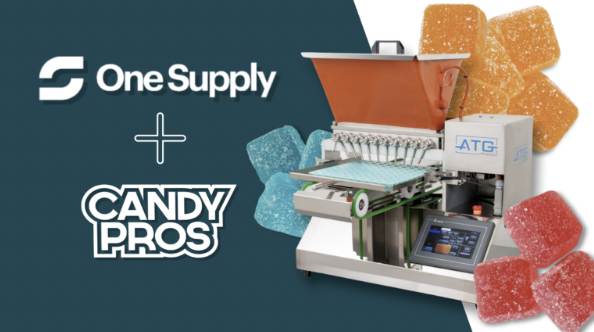- February 29, 2024
Elevating Cartridge Filling: ATG Pharma’s Personalized Approach to Automation
In the ever-evolving landscape of manufacturing, efficiency and accuracy stand as crucial factors determining success. [...]
- January 30, 2024
Cultivating Green Dreams: A Masterclass in Cannabis Automation
In the dynamic and fast-paced cannabis industry, embracing automation becomes essential for your business’s growth [...]
- January 19, 2024
One Supply and Candy Pros: A Winning Team for the Gummy Industry
“Talent wins games, but teamwork and intelligence win championships.” – Michael Jordan Introduction to the Gummy Industry: [...]
BLOG
Ultimate Cannabis Business Quick Start Guide
Retail and Grow Operations aren’t the Only Options!
Most of the conversations in cannabis business revolve around cultivation and retail – but there are a wide array of opportunities and business types for entrepreneurs seeking entry into this new, exciting industry. Your business doesn’t have to be limited to only retail or a grow operation. The market has demonstrated that edibles, tinctures, and other forms of concentrates are on the rise.
The most important question to start with is –
What Kind of Cannabis Business Do You Want to Start?
In his presentation to Canacord called ‘Playing the Long Game,’ president of BDS Analytics (BDSA) Roy Bingham examined Q1 2022 vs. Q1 2021 data to see which formats were ‘winning’ when it came to cannabis.
Image Data Source: BDS Analytics Q1 2022 Market Overview
While flower still dominated the market, looking at the two years in comparison showed that Flower was losing its market share, while Concentrates, Edibles, and Prerolls were all on the rise. All of these areas present unique opportunities and challenges within the cannabis industry.
Image Data Source: BDS Analytics Q1 2022 Market Overview
When considering what kind of cannabis business you want to start, it’s also wise to take that time to also think about where you want to start your business – each individual state’s market also has its own nuances. For instance, in the newly minted state of New York, vapes hold a higher percentage than in Arizona, where flower remains dominant at around 41% of the market.
Be sure to know as much as possible about the business that you want to start, and research the markets thoroughly.
Know the Laws of Your State
Part of thorough market research is going to be knowing all of the laws in your country and state. Make sure you understand how those laws impact your current and future product lines.
Find An Automation Partner
In a fast-moving, highly-regulated industry like cannabis it’s important to gain any efficiencies when possible. The best way to do this is automation – and it’s important to consider what automation strategies you’ll be using up front. The industry faces price compression, regulation shifts, and consumer profile shifts often, and by gaining efficiencies in automation it helps ensure your businesses’ long-term success.
Possible Automation Partners:
Cultivation:
Extraction Equipment :
Filling and Packaging: ATG Pharma prides itself on exceptional equipment and support. We have over 20 years of experience in what we do, and have created strategic partnerships and relationships across the industry to support many different automation needs.
Create a Business Plan
Before you sit down to create your business plan, you’ll want to do deep dives into those topics that you were doing research in before. When creating your business plan, you’ll want to explore all of the innovations, particularly any automation opportunities. Market and price compression require lean businesses, and throughout your business plan be sure to consider how you can streamline operations and, ultimately, financial need.
To create a thorough business plan, make sure that it covers the following topics.
- Executive Summary: A brief overview of your business. Include products or services you will offer, your target market, and your financial goals.
- Industry Analysis: An overview of the cannabis industry, including market size, growth trends, and key players. Make sure to hone in on the numbers that impact your business in particular. It should also include a SWOT analysis of your specific business.
- Market Analysis: A detailed analysis of your target market, including demographics, buying habits, and competitors. Depending on the state in which you plan to operate, there are a lot of opportunities for in-depth market analysis based on information that is freely available.
- Products and Services: A description of the products or services you will offer, including pricing, packaging, and branding.
- Marketing and Sales: Outline your marketing and sales strategies, including how you plan to reach your target market and what channels you will use to promote your products or services.
- Operations: Describe how your business will operate, including your organizational structure, key personnel, and any equipment or technology you will need.
- Financial Projections: Include financial projections for the next three to five years, including income statements, balance sheets, and cash flow statements.
- Conclusion: Summarize the main points of your business plan and reiterate your financial goals.
- Appendices: Include any additional information, such as resumes of key personnel, licenses, and permits, and other relevant documents.
Remember – a well-researched and impeccably documented business plan that includes sensible, streamlined operations and demonstrates regulatory savvy will help ensure your businesses’ success!
Secure Funding for Your Business
Cannabis businesses are notoriously hard to get funded, but that doesn’t mean it’s impossible! Make sure to present your best information to possible investors. Cannabis businesses have had successes in exploring the following funding opportunities.
- Crowdfunding: Platforms such as Kickstarter and Indiegogo can be used to raise funds from a large number of investors.
- Angel investors: High net-worth individuals who are willing to invest their own money in startup companies.
- Venture capital: Funds managed by professional investors who invest in high-growth potential companies.
- Community banks and credit unions: Some institutions are starting to serve the cannabis industry, but it depends on their policy and state laws.
- Family and friends: Many startups turn to their personal networks for funding.
Choose the Right Physical Location for Your Business
There are lots of things to consider when picking the right location for your cannabis business. Make sure you don’t lose sight of the following when picking your location!
- Legal environment: The laws and regulations surrounding cannabis use and production vary from state to state, county to county and even street to street – so it’s vital to ensure that the location is compliant with local laws and regulations in addition to meeting your needs.
- Zoning: Many municipalities have specific zoning laws that dictate where cannabis businesses can be located. Make sure your ocation is zoned appropriately.
- Access to resources: Cultivation, extraction, and retail businesses will all require different sorts of resources, such as water and electricity.Be sure that the location you select has access to the necessary resources to support the business.
- Proximity to customers: Retail businesses will want to be located in areas where there is a high density of potential customers.
- Competition: Research the competitive landscape in the area to ensure that the location isn’t oversaturated with similar businesses.
- Security: Security is a crucial aspect to consider, this includes from both internal and external theft and vandalism.
- Access to labor: It is important to ensure that there is a readily available pool of qualified labor to staff the business.
Hire Employees and Train Staff
Exceptional businesses require exceptional staff – and exceptional training. Make sure you have a firm grasp of onboarding processes, SOP’s, and other training materials before bringing your staff in. Using equipment that has certified processes helps create the documentation you need to succeed.
Open and Market Your Marijuana Business
Once everything is in place, it’s time to market and open your business! Continue your good momentum by placing your business’ best foot forward.
Research the local laws and regulations for marketing cannabis businesses in your area. Make sure you are compliant with all laws before opening your business.
Build a strong brand for your business. This includes creating a logo, website, and social media presence.
Develop a comprehensive marketing strategy. This should include both online and offline marketing efforts, such as social media advertising, email marketing, and event sponsorships.
Network with other cannabis businesses and industry professionals. Attend trade shows and conferences, and join industry groups and associations.
Offer excellent customer service. Create a welcoming and knowledgeable staff, and build relationships with your customers, regardless of the type of business you run – you will always have customers.
Continuously evaluate and adjust your strategy as the cannabis industry and laws continue to evolve.
Make sure you maintain familiarity with all regulations and laws regarding recreational/medical use of marijuana in your area.
Be vigilant, and don’t be caught off-guard!



